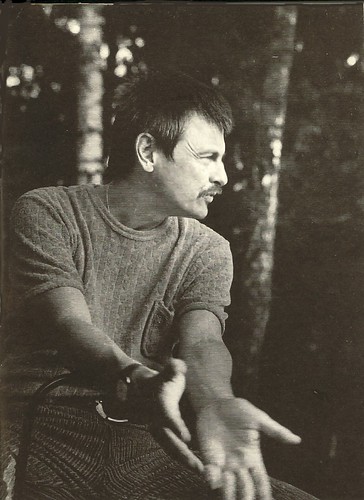An extensive archive of letters, book drafts, audio tapes and photographs relating to the film director Andrei Tarkovsky is to appear at auction in London.
Sotheby's has announced it is to sell an archive of one of the most revered figures in cinema, a man whom Ingmar Bergman called "the greatest … the one who invented a new language of film."
Tarkovsky's films, always intellectually stimulating and usually long and slow-moving, routinely come top or very high in film lists. The Guardian named his 205-minute Andrei Rublev as the best arthouse film of all time, and the BFI's once-a-decade greatest film poll put three Tarkovsky creations in the top 30 – Mirror at 19, Andrei Rublev at 26 and Stalker at 29. Mirror came ninth in a parallel BFI list decided by 358 directors. [N.B. What a habit these English-soaking peoples have in creating funny, if not phony, hierarchies!]
Sotheby's head of books and manuscripts, Stephen Roe, said the archive gave fascinating insights into Tarkovsky's approach to cinema. "It is probably the only papers relating to Tarkovsky that are ever likely to come on the market in the near future," he said.
The archive is being sold by Olga Surkova, who was Tarkovsky's pupil, amanuensis and friend as well as co-author of the book Sculpting in Time, in which the director sets out his theories on cinema. [N.B. Amanuensis ( /əˌmænjuːˈɛnsɪs/), plural amanuenses, is a person employed to write or type what another dictates or to copy what has been written by another, and also refers to a person who signs a document on behalf of another under their authority. The term derives from a Latin expression made up of a suffix, -ensis, "belonging to", and prefix, manu-, "hand".]
The archive covers his life as well as his work. One of the most poignant items is a draft of a letter he wrote to President Leonid Brezhnev in which he argues that he be allowed to work in the Soviet Union and calls for his films – banned by the authorities – to be released.
"For three and a half years the film has been kept away from the screen … Andrei Rublev was not and could not have been used for any kind of anti-Soviet propaganda … I do not have any opportunity to exercise my creative ideas," he wrote.
The situation was having a profound effect on Tarkovsky. "If I do not have any work, I cannot make a living, though I have a wife and a child. I do not feel comfortable talking about that, but my situation has been unchanged for so long that I cannot keep silence any longer."
The letter had little effect and in 1984 he vowed to never again return to the Soviet Union. He died of lung cancer in Paris in 1986 at the age of 54.
Also in the sale are notebooks with shot-by-shot analysis of his films; printed scripts for films, containing significant differences to the final versions; and a collection of 32 audio tapes and 13 MiniDiscs from his final years on which he talks about his films and cinema.
There are photo albums of Tarkovsky and his family on holiday in places such as the Grand Canyon in the US, Italy and Stonehenge in the UK, as well as pictures of the director with other Russian luminaries such as the cellist Mstislav Rostropovich.
Tarkovsky made seven feature films, including Solaris, Nostalghia, and The Sacrifice. "He is regarded as, after [Sergei] Eisenstein, the most important Russian film director of the 20th century and one of the greatest of all time," Roe said. [N.B. Somebody should inform Roe that his statement is a glaring display of bourgeois impotence at grasping truth(s).]
Tarkovsky has influenced a legion of film-makers. Explaining why he dedicated his film Antichrist to Tarkovsky, the director Lars von Trier told one interviewer: "Have you ever seen a film called Mirror? I was hypnotised! I've seen it 20 times. It's the closest I've got to a religion – to me he is God." [N.B. The film’s dedication at the end to Tarkovsky – a lot of people at Cannes were shocked to see that. Why Tarkovsky?
‘Have you ever seen a film called the “Mirror”? I was hypnotised! I’ve seen it 20 times. It’s the closest I’ve got to a religion – to me he is God. And if I didn’t dedicate the film to Tarkovsky, then everyone would say I was stealing from him. If you are stealing, then dedicate.’]
Steven Soderbergh, who remade Solaris with George Clooney in the lead role, once said: "I'm a big fan of Tarkovsky. I think he's an actual poet, which is very rare in the cinema, and the fact that he had such an impact with only seven features I think is a testament to his genius."
The archive will be sold by Sotheby's on 28 November and has an estimate of £80,000-£100,000. Strong Russian interest is expected. "Russians ought to be interested in it because it is so fundamental to their artistic history," Roe said. [N.B. Tarkovsky would have stood against this bourgeois Roe just as much as he did with the red Roe of his time.]
Traducere // Translate
We cannot understand Tarkovsky
but we re-sell him 1000 times and more
Abonați-vă la:
Postare comentarii (Atom)

Niciun comentariu:
Trimiteți un comentariu